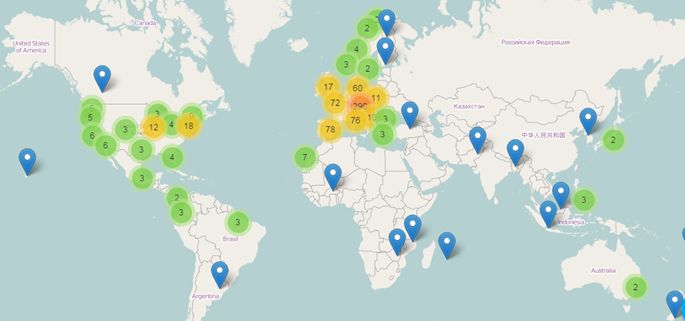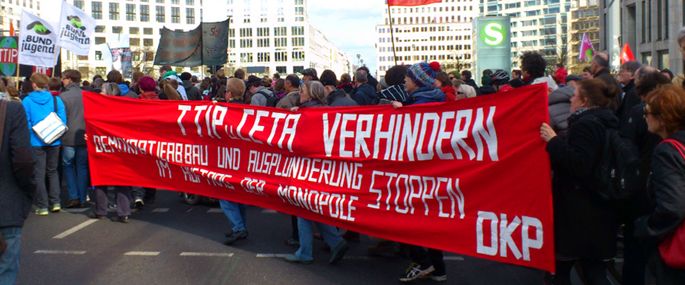Over the weekend, ahead of the latest and ninth round of talks between the European Commission and the US on the preparation of the Transatlantic Trade and Investment Partnership (TTIP), 750 protests took place in 45 countries around the world against the Atlantists’ initiatives (see the map below). In a statement by the organisers of the demonstrations, it says: «Over the past few decades, corporations and governments have entered into secret treaties and investment agreements at the expense of our rights and the environment». The assault on democracy being carried out in the name of liberalisation is giving rise to growing opposition.
Europeans are showing the greatest activity (indicated by the yellow circles on the map), with protests rising to a fever pitch in Germany where there have been 290 demonstrations against the Transatlantic agreement. The largest demonstration took place in Munich, attracting between 15,000 and 23,000 people according to various estimates. In Cologne, which is renowned for its carnivals, several hundred demonstrators sang topical poems set to the melodies of carnival songs. The Stuttgart police counted thousands of demonstrators, while police in Ulm counted 1,200. Two thousand demonstrators gathered in Leipzig and the same in Nuremberg, 1,200 in Kassel, 700 in Frankfurt, and 600 in Kiel. In Berlin, 4,000 people formed a human chain stretching from the offices of the European Union to the US embassy and from there to the Canadian embassy (see the photo below).
German discontent is widespread, and this is despite the fact that the US president’s Transatlantic agreement initiative was immediately welcomed by German politicians, while the media, without scrimping on colours, is busy painting the rosy future that awaits the European economy as a result of reduced tariff barriers.
Formal negotiations over the TTIP began almost two years ago and a working group to help prepare them was put together even earlier in 2011. The former president of the European Commission, José Manuel Barroso, called the planned agreement historic, while Barack Obama said that a free trade zone agreement with the EU would increase American exports, create new jobs and expand access to Asia’s growing markets. The fact that the US, worried about the outcome of global economic competition with China, is seeking to ‘secure its rear’ at the expense of Europe, that US goods will begin forcing out the products of European manufacturers from both domestic and Asian markets, has taken a back seat in these prognoses.
Proving to be of increasing concern is the fact that the negotiations are going on behind closed doors away from the public eye. Objective information on the conditions of the planned agreement is not being made available to experts, and even less so to broad sections of the public. Speaking at the demonstration in Munich, meanwhile, the chairman of the Union for Environment and Nature Protection, Hubert Weiger, said that the Transatlantic agreement is threatening to dismantle the environmental, social and cultural standards adopted in German society. The leader of the Left Party, Bernd Riexinger, who attended the demonstration in Kassel, agrees with him: «The customary standards for food, environmental protection, employment, government services – all these will be turned upside down with the conclusion of the agreement». From the standpoint of the German left, the TTIP will be the biggest boon for corporations and, at the same time, the end of democracy as Germany has known it thus far. In the small German city of Husum in northern Germany, a symbolic protest even took place involving the burying of democracy.
People are most concerned about the forthcoming unification of quality standards and product certification. Speaking on 18 April at a pre-election rally in Greifswald, Chancellor Merkel reassured people that quality standards cannot change because, she said, they are enshrined in German legislation. So what have European and American experts been negotiating for the past two years? What is meant by the infamous unification of standards?
The prospect of liberalising services in the utilities sector is also upsetting the Germans. If truth be told, this refers to an attack on social standards that exist in European countries but that the US has never had. Should the contract come into effect, Germany municipalities will see a wave of privatisation that will affect social services, youth services and education. An investor from the US or Canada would be able to demand reimbursement from municipalities if their profits are low, for example, due to existing anti-noise or environmental protection provisions in a given administrative district.
In the four years since TTIP preparations began, ordinary Europeans have not accepted the idea of a rapprochement with the United States in the name of liberalisation and have certainly not resigned themselves to attempts to impose this rapprochement from above. A powerful demonstration by TTIP opponents is scheduled to take place in Berlin on 10 October and signatures are still being collected for the European Initiative against TTIP and CETA (CETA is a trade and economic agreement between Canada and the EU similar to the TTIP). To date, more than 1.7 million signatures have been collected. Despite attempts by the European Commission to prevent opponents of the further liberalisation of trade and economic ties with the US and Canada coming together, this civil initiative has so far united more than 250 organisations in 21 EU countries. Leaders of the initiative do not expect that Brussels will listen to them, however. Their hopes are linked to the fact that the Atlantists’ agreement drafts are subject to the approval of the Council of the European Union and the European Parliament.











